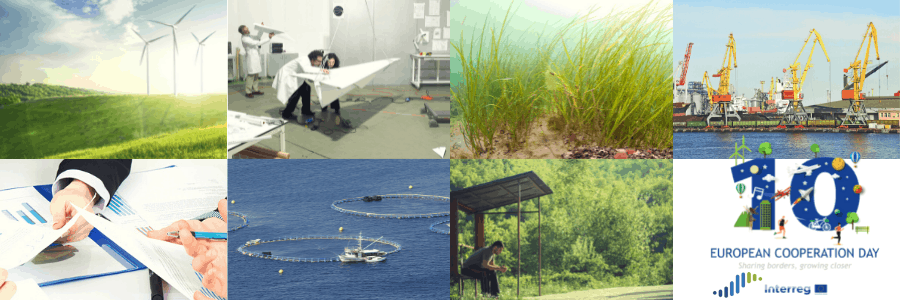
Copyright left to right: © Thinkstock/artJazz, © Thinkstock/Michael Blann, © Wolf Wichmann, © Getty Images/unkas_photo, © Thinkstock/gmast3, © Thinkstock/mrak_hr, © Thinkstock/Darlildo
Today we celebrate the 10th anniversary of the European Cooperation Day, a campaign raising awareness on how working together on bright ideas brings meaningful results. Interreg Baltic Sea Region commemorates this day with a few personal experiences from our project partners on how and why transnational cooperation is beneficial to our region.
Why do we need a ‘European Cooperation Day’?
The belief that through cohesion and solidarity among countries we can all grow together is founding principle of the European Union. Since 2011, European Cooperation Day promotes the valuable results of cooperation among regions to a wider audience. The campaign is celebrated all over Europe and beyond on 21 September every year. Everybody can join it both online and offline. So, find an event that interest you and come celebrate with us this important day.
What is Interreg and how is it linked to transnational cooperation?
Interreg or European Territorial Cooperation (ETC) is one of the initiatives implemented to bring the vision of a united Europe to life. The Interreg 2014-2020 allocated more than 10 billion euros to foster cooperation among European regions on pressing issues for the future of our society. Interreg’s overarching objective is to promote a harmonious economic, social and territorial development of the European Union as a whole.
The Interreg Baltic Sea Region Programme 2014-2020 contributed to this objective by supporting cooperation initiatives for a more innovative, better accessible and sustainable Baltic Sea region. In the past seven years, the Programme allocated € 253 million for around 200 projects, collaborating with more than 2,000 partners across the region.
What are the advantages of working in a transnational team?
Teamwork enables a sustainable approach to problem solving, looking at long-term benefits rather than short-sighted gains and putting the well-being of the many before the interest of the few. When bringing forward an idea, doing it in a transnational team means learning from each other by sharing different perspectives and knowledge, ultimately achieving the planned objectives in the most efficient way. But what does it imply in practice? Listen to what our project partners have to say about this.
 “Working in a transnational team made me quickly understand that there is not just one perspective from which to look at a specific problem. Even when countries are very different from each other it is still possible working together fruitfully, finding a common solution that can be adapted to many cases. By collaborating, we could identify the common challenge and understand how to address it equally in all the six countries involved in AREA 21.”
“Working in a transnational team made me quickly understand that there is not just one perspective from which to look at a specific problem. Even when countries are very different from each other it is still possible working together fruitfully, finding a common solution that can be adapted to many cases. By collaborating, we could identify the common challenge and understand how to address it equally in all the six countries involved in AREA 21.”
Jonas Fischer, research assistant at AREA 21, ©Nancy Kretschmann
 “Even though we’re all in the European Union and we all have European directives guiding us, when it comes to energy, everything is still very much nationally determined. How quick do we want to get out of fossil fuels? And how do we do that? What kind of funding do we allocate to the areas that are going to be affected by a coal exit? All of these things need to be also considered from a national perspective to understand the national legislation, policy, interests and culture. It was thus crucial to cooperate with experts from different countries across the Baltic Sea region when implementing our project.”
“Even though we’re all in the European Union and we all have European directives guiding us, when it comes to energy, everything is still very much nationally determined. How quick do we want to get out of fossil fuels? And how do we do that? What kind of funding do we allocate to the areas that are going to be affected by a coal exit? All of these things need to be also considered from a national perspective to understand the national legislation, policy, interests and culture. It was thus crucial to cooperate with experts from different countries across the Baltic Sea region when implementing our project.”
Anika Nicolaas Ponde, communications manager at Baltic Integrid, ©IKEM
 “Blue bio-economy is such a new industry that the experts and actors working in the field are rare. However, the value chain from collection/harvesting of raw material, research, product development, piloting, upscaling, marketing to legal issues needs lots of expertise. So, only by combining all the existing expertise and knowledge present in the Baltic Sea Region is actually possible to develop sustainable blue bio-economy products. This is what we did with the Blue Platform project.”
“Blue bio-economy is such a new industry that the experts and actors working in the field are rare. However, the value chain from collection/harvesting of raw material, research, product development, piloting, upscaling, marketing to legal issues needs lots of expertise. So, only by combining all the existing expertise and knowledge present in the Baltic Sea Region is actually possible to develop sustainable blue bio-economy products. This is what we did with the Blue Platform project.”
Anne-Mari Luhtanen, project manager at the Blue Platform
 “Each country in the Baltic Sea region has its own legislation and its own approach on maritime spatial planning. There are countries in which every decision taken in maritime spatial planning is quite binding. Then there are other countries that are approaching to this matter differently and give recommendations that aren’t legally binding. By coming together, we generated a common understanding and contributed to increasing coherence on maritime spatial planning all over the region.”
“Each country in the Baltic Sea region has its own legislation and its own approach on maritime spatial planning. There are countries in which every decision taken in maritime spatial planning is quite binding. Then there are other countries that are approaching to this matter differently and give recommendations that aren’t legally binding. By coming together, we generated a common understanding and contributed to increasing coherence on maritime spatial planning all over the region.”
Inga Jēkabsone, project manager at CAPACITY4MSP
 “When considering small countries like Latvia or Lithuania, you have to think that we have small markets. We cannot have all the knowledge and all the value chain within the country. However, we still need to access and we still want to be part of the LNG market. To do this, we have to build something locally and maybe export something else to other countries. This is what we did in our project. We built the value chain relying on all the partner strengths. The transnational component was thus essential to enable a successful business partnership which produces competitive products and services.”
“When considering small countries like Latvia or Lithuania, you have to think that we have small markets. We cannot have all the knowledge and all the value chain within the country. However, we still need to access and we still want to be part of the LNG market. To do this, we have to build something locally and maybe export something else to other countries. This is what we did in our project. We built the value chain relying on all the partner strengths. The transnational component was thus essential to enable a successful business partnership which produces competitive products and services.”
Andrius Sutnikas, project manager at GO LNG
What’s next?
Interreg Baltic Sea Region 2021-2027 will soon offer new funding to public and private players around the Baltic Sea with innovative, water-smart and climate-neutral ideas. The ultimate aim is to improve the life of people in the region.
To learn more about our Programme, our four priorities and future funding opportunities, you should attend the Programme Kick-Off event on 28 September from 15:00 to 17:00 CET. More information and the link to register can be found here.
Finally, to be sure stay updated on all the latest news concerning our Programme and avoid missing any key announcement, subscribe to our newsletter here.






